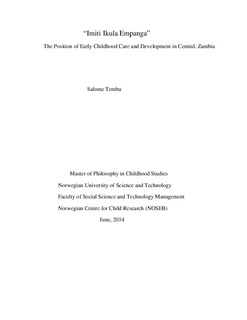| dc.description.abstract | Early Childhood Care and Development (ECCD), has received considerable attention in the world today. It makes reference to systems and mechanisms implemented for the improvement of children’s lives from 0-8 years old. These provisions are made through pre-schools, nurseries and community schools among others. Advocates of ECCD argue that it will help prepare children for formal education and children in the poorest communities stand to benefit the most from this program.
The focus of this thesis is ECCD in Makululu which is an informal settlement area in Kabwe, Central Zambia. It draws from participant observation, dialogues, interviews, focus group discussions and drawings with children, parents/guardians, grandmothers and caregivers. The thesis is informed by the theoretical perspectives of the sociology of childhood which postulates that childhood is socially constructed; children are active thinkers and doers therefore social actors who are capable of making meaning of their lives and those around them. The rights perspective as provided by the UNCRC and ACWRC is also employed in this study as it postulates that children have a right to express their views in matters that concern them.
As a point of departure, the views of parents/guardians and caregivers and the District Planning Officer at the Ministry of Education are used to give the context of the ideas and values in which children are experiencing ECCD. This is consistent with the argument forwarded by Abebe & Kjørholt (2013). The objectives of the study include exploring how local knowledge is integrated into ECCD as well as exploring the meaning and interpretation of the proverb ‘imiti ikula empanga which is a common Zambian proverb in one of the seven main languages. The views of children on childhood and the role of the family in ECCD will also be explored.
According to the findings, the aforementioned proverb is understood as meaning children are a sign of continuity and future leaders. The understanding of the proverb shows the value of children in the Zambian society. With regard to the views of children about childhood, my study shows that children view childhood in threefold. Childhood is a time of play, a time for learning chores for future responsibilities and a care receiving and care giving phase in life. The children also view the role of the family as primary decision makers in the education and as providers of material and social support for the children in ECCD. As indicated by the study, children are viii
capable of making meaning of their lives and understanding the different aspects of socio-cultural and socio-economic aspects of their lives.
With regard to the role of ECCD, my study shows that it is viewed by children as the beginning of education whereas adults view it as preparation for formal education which begins in grade one. ECCD is also seen as a platform for learning the official language which is English in Zambia. There are differing opinions with regard to the use of the official language in ECCD with some parents arguing that emphasis should be placed on it while others argue for a balance between the official and local language.
The integration of local knowledge in ECCD is an important discussion among service providers and policy makers today. In Africa, local knowledge is inclusive of oral tradition and customary practices that transmit ways of knowing in the everyday social and cultural lives of the people (Eder, 2010; Kresse & Marchand, 2009; Nyota & Mapara, 2008; cited in Jirata & Benti, 2013) . With regard to ECCD, note that one of the obstacles to the use of indigenous knowledge in early childhood policy making, programming and implementation in Africa is the lack of contemporary research and documentation of local childrearing practices, tradition, norms and beliefs(Schafer et al., 2004)
My findings indicate that local knowledge is valuable for ECCD and drawn from my research, it is integrated through socio-cultural practices, songs, folktales, stories and dances. The use of local toys and materials is also employed. In conclusion, the argument for appropriate and relevant ECCD services in Africa is timely and well meaning. Therefore a call is made to explore ECCD with the input of children, their families and communities to ensure that governments and partner organizations are well informed and equipped to develop relevant policy and program implementation. | nb_NO |
